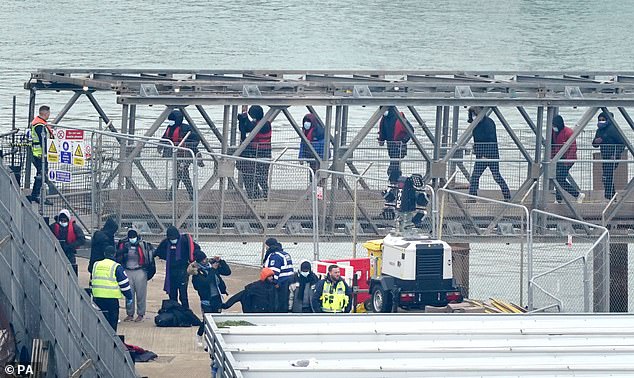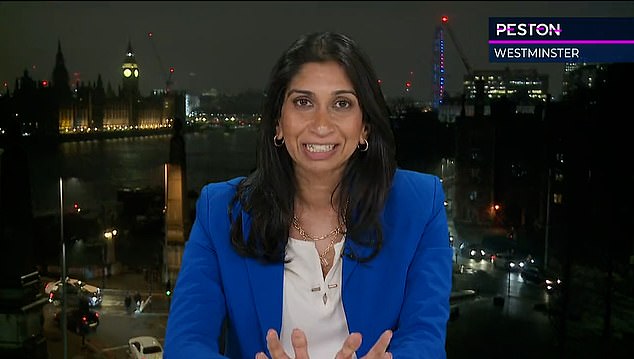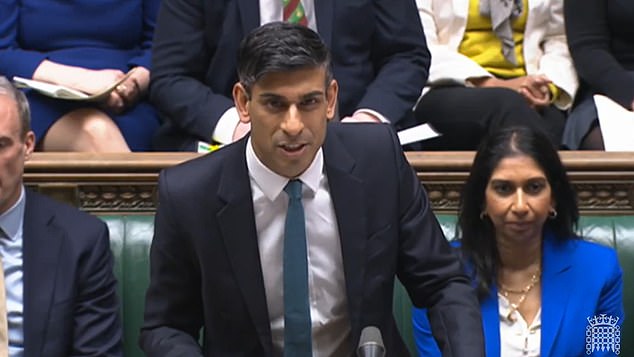The government plans to fight any challenge from the European Court of Human Rights that attempts to block the Prime Minister’s new immigration bill banning small boats from crossing the English Channel.
Ministers are drawing up a delay strategy to appeal any ruling the court may make against the UK and implement the policy anyway during any legal proceedings.
This could help the government prevent it from abandoning the ECHR entirely.
Government ministers reportedly believe that even if a final ruling is made against the UK for implementing the legislation, they are unlikely to be required to implement the ruling immediately and could ignore it for several years.
This is because figures suggest that around 40 per cent of major rulings affecting EU states handed down in the last decade have yet to be acted upon, Whitehall sources told the Times.
The government is planning to fight any challenge from the European Court of Human Rights that would try to block the Prime Minister’s new immigration bill (pictured at PMQ yesterday) which bans small boats from crossing the English Channel.

A group is brought ashore at Dover after crossing the Channel earlier this week.
Home Secretary Suella Braverman told BBC Radio 4’s Today program that the government “strongly believes that our proposals are legal”.
And Prime Minister Rishi Sunak has said he is “prepared to do battle” with the ECHR in Strasbourg.
Mrs. Braverman, however, admitting to parliamentarians that there is “more than 50 per cent chance” that the legislation is not compatible with the European Convention on Human Rights (ECHR).
The new legislation gives ministers the power to ignore any rulings made against the government’s plans to detain and deport all migrants arriving in the UK in small boats. Therefore, even if a case were brought before the ECtHR, the government could still move forward with the plan as the case is heard, which could take three years.
A government source told the Times that they do not want to “trigger a full-on confrontation with the court,” but rather that “the plan is to implement the policy while the process is underway.”
Announcing the plans in the House of Commons on Tuesday, Braverman said asylum seekers who arrive illegally will be detained without bail or judicial review for 28 days before being “swiftly expelled” to their country of origin or to a “safe third country” like Rwanda.
They face a lifetime ban on returning once deported and will never be allowed to settle in the country or obtain citizenship.
The viability of the bill has been questioned as plans such as forcibly expelling asylum seekers to Rwanda are caught up in legal challenges.

Home Secretary Suella Braverman (pictured) said the government “strongly believes that our proposals are legal”, in an interview with BBC Radio 4’s Today programme.

French President Emmanuel Macron has called for an increase in UK funding to stop English Channel crossings.
It comes ahead of an Anglo-French summit in Paris tomorrow between Prime Minister Rishi Sunak and Macron, where Channel migrants will be high on the agenda.
It is the first bilateral summit between France and Britain in five years and both sides are seeking to repair relations after painful disputes over English Channel migrants, post-Brexit trade deals and the Aukus submarine deal with Australia.
And French President Emmanuel Macron has called for an increase in UK funding to stop Channel crossings.
London and Paris are in talks over a multimillion-dollar long-term deal to increase French patrols, surveillance and beach officers to crush trafficking gangs.
Elysee Palace sources say both sides are trying to achieve a “multi-annual financing framework” that would put cooperation on a stable basis and allow “better planning of our actions.”

